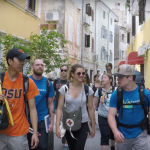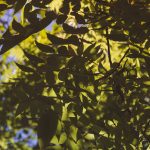
Renewable materials student Cody Knight is a recipient of three scholarships: the Lois & Dick Kearns Scholarship, John R. Snellstrom Scholarship and the Friends of Renewable Materials–Roseburg Forest Products Wood Science and Engineering Scholarship. Before coming to Oregon State, Knight served in the military.
The financial support he receives and his experience in the military inspired him to serve others through his work in the renewable materials program.
“My military experience left me asking a lot of questions about humanity, sustainability the western world and material possessions,” Knight says. “I want to create products from renewable materials that aid in sustainability.”
Knight, who grew up in northern Idaho, remembers spending summers at the lake, sleeping in log cabins.
“There, it was easy to appreciate the beauty of nature,” he says. “I want to preserve that beauty and those kinds of experiences for future generations.”
He’s working to reach his goals through hands-on learning activities outside the classroom. Knight has participated in undergraduate research with Arijit Sinha, associate professor of renewable materials at Oregon State. Knight is helping conduct testing on Freres Lumber’s new mass plywood panel product.
“I was also selected for the Research and Extension Experience for Undergraduates (REEU) program,” Knight says. “This is a three-month long mentored research program with students at Oregon State and from colleges across the United States.”
Knight says his research will evaluate the shear strength of plywood and oriented strand board (OSB) after it has experienced varying degrees of temperatures and cooling times to get a clear picture of the mechanical strength of both products in the event of fire and seismic activity.
“The importance of this is plywood and OSB are typically used in residential housing for the exterior sheathing, which provides lateral support and stability for the structure,” Knight says. “Little research has been done to test their behaviors under these conditions, and I’m excited to find some answers.”


